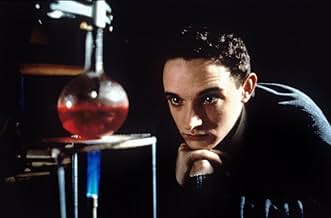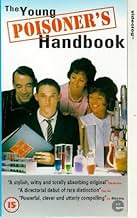Agrega una trama en tu idiomaThis film is based on a true story about a British teenager who allegedly poisoned family, friends, and co-workers. Graham is highly intelligent, but completely amoral. He becomes interested... Leer todoThis film is based on a true story about a British teenager who allegedly poisoned family, friends, and co-workers. Graham is highly intelligent, but completely amoral. He becomes interested in science, especially chemistry, and begins to read avidly. Something of a social misfit... Leer todoThis film is based on a true story about a British teenager who allegedly poisoned family, friends, and co-workers. Graham is highly intelligent, but completely amoral. He becomes interested in science, especially chemistry, and begins to read avidly. Something of a social misfit, he is fascinated by morbid subjects such as poisons and murder. His family environment i... Leer todo
- Premios
- 1 premio ganado y 2 nominaciones en total
- Dirección
- Guionistas
- Todo el elenco y el equipo
- Producción, taquilla y más en IMDbPro
Opiniones destacadas
Graham Young (Hugh O'Conor) I found an odd mixture of three parts: curiosity (what leads him to poisoning), clinical detachment (as he watches the results), and a longing to belong (when he tries to be normal -and fails miserably).
First he silently threatens everyone with a gruesome retaliation for the slightest things, and then charts their decline with frightful accuracy as they get sicker and sicker. After that, he retreats into his den again until something better comes along. And then he gets caught.
Then there's that uproarious scene when he's out with a girl, and he tries to get her in a conversation on disembowelment. You can almost see her turn green as he gets into stride. To him, it's an innocent thing; something he likes. For her (and for us, the audience), it's...sick.
I thought that the rehabilitation sequence was a farce. It's as ludicrous as the rest of this quirky gem of a movie, with great performances by all the actors, particularly Hugh O'Conor. He says more with his eyes than most could with their lips.
I mean, the movie is funny (not ha ha funny, though), dripping with corrosive irony. Young is all at once twisted and innocent, torn between conforming and that endless fascination with poison. The comparisons between this and "Clockwork" are almost inevitable, but unlike Kubrick's thriller, this one has a more subtle, menacing tone, for the mind rather than for the eye. It's not a laugh-out-loud film, though it's undeniably hilarious. Whatever you feel, it's kept inside.
If you're one with a sensitive stomach, suicidal tendencies, strange addictions, goody-goodies/puritans, then stay away. Otherwise, WATCH THIS FILM!
I shudder to think how this plot and characters would have been handled in a mainstream Hollywood movie! I can just see Leo or Toby in the lead role, an "explanation" for his psychotic behaviour, and an uplifting, heart warming happy ending. Thankfully Benjamin Ross has a more unique vision, and he has given us a movie that will stay with you for years to come. 'The Young Poisoner's Handbook' is fantastic!
This is pitch black British comedy near its best, reminiscent of both Hitchcock and 'A Clockwork Orange' -- its three-part structure is similar to that of 'A Clockwork Orange,' given that the protagonist is free, then confined, then free again to illustrate the vanity of "rehabilitation" where it concerns psychopaths, and we even hear excerpts from Purcell's Funeral Music for Queen Mary, which Wendy Carlos incorporated into her electronic score for 'Clockwork.' Whether 'The Young Poisoner's Handbook' is paying homage or borrowing, the movie itself is a highly individual work that should please anyone with a fondness for Orwell or Ealing.
Hugh O'Conor, with his wide-eyed gift for simulating innocence, is an ideal selection for the role of Graham Young, the real-life poisoner of the British village of Bovingdon, who slowly poisoned his stepmother to death with antimony sulfide, finishing the job with thallium. Cursed with a banal home life and a sociopathic mind, his self-described "gift for chemistry" is put to obviously nefarious uses, occasionally using friends as guinea pigs before the main attraction.
The director, Benjamin Ross, makes a tremendously impressive debut here. His selection of music together with his fluid editing and camera-work often produce stirring and exciting results, the 1960s small British town setting keenly observed, with a very black wit. Graham's wicked stepmother, played by the singular Ruth Sheen (seen in many Mike Leigh films), joyfully accepts her first dose of poison after finding a box of Velvet Victories chocolates on her bedroom pillow, with a note reading "To my darling mother, xxxx." There's a vivid sense of the dustiness of the Young household, the darkness of Graham's bedroom punctured by the eerie glow of his flasks, the frustration of an overcrowded working class household where the telly's always running with the silliness of popular variety programs. The film also adroitly contrasts the self-important grandeur of Young's genocidal ambitions with the unglamorous pettiness of the actual crimes and the prosaic Bovingdon environment to which his perpetration of them was fortunately limited (the real Graham Young had wanted to be known as "The World's Poisoner," but was instead given the considerably less flattering moniker "The Teacup Poisoner"). Absurdity and grimness are very skillfully balanced. A marvelous, overlooked film.
Through Graham's eccentric (to say the least) point-of-view, we witness the painfully mundane Young family, the pitifully easy to fool psychiatric and medical community, and the pathetically simple-minded middle-class. Ross captures the comic disdain with which Graham sees his surroundings without disposing of the distance necessary to be horrified at Graham's "experiments" and the fate of his unwitting subjects.
Because of Ross' careful tightrope walking between distance from and intimacy with Graham, the audience can't fully fall under Graham's spell and sympathize completely with him. There are some gruesome scenes of people reacting to poison, but these are necessary to heighten the audience's horror at Graham's incapability to assess his own actions and to recognize his own evil. Ross gives us an entertaining, yet twisted, glimpse into genius gone wrong, without sensationalizing Graham as a hero.
It is also very hard to go out for drinks or coffee after seeing this movie.
¿Sabías que…?
- TriviaThe film was not screened at many local cinemas, due to the tone of the film, and out of respect for the surviving victims, and the relatives of the dead.
- ErroresWhen Dr. Zeigler visits the institution for mentally unstable criminals in which Graham is hospitalized, the director of the institution says, referred to another patient: "Vulpes pilum mutat, non mores", saying it means "The leopard never changes his spots". Graham corrects him, saying it means instead: "The wolf changes its fur, but not its nature". Actually, "vulpes" means "fox".
- Citas
Graham Young: I want to be the greatest poisoner the world has ever seen.
Selecciones populares
- How long is The Young Poisoner's Handbook?Con tecnología de Alexa
Detalles
- Fecha de lanzamiento
- Países de origen
- Idioma
- También se conoce como
- Den unge giftmördarens handbok
- Locaciones de filmación
- 49 Warren Road, Neasden, Brent, Londres, Inglaterra, Reino Unido(Young family home)
- Productoras
- Ver más créditos de la compañía en IMDbPro
Taquilla
- Total en EE. UU. y Canadá
- USD 536,825
- Total a nivel mundial
- USD 536,825
- Tiempo de ejecución1 hora 39 minutos
- Mezcla de sonido
- Relación de aspecto
- 1.66 : 1
Contribuir a esta página





























